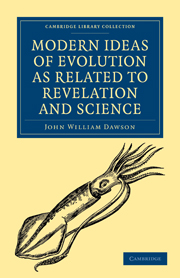Book contents
- Frontmatter
- PREFACE
- Contents
- CHAPTER I PRESENT ASPECTS OF THE QUESTION
- CHAPTER II WHAT IS EVOLUTION?
- CHAPTER III THE ORIGIN OF LIFE
- CHAPTER IV THE APPARITION OF SPECIES IN GEOLOGICAL TIME
- CHAPTER V MONISTIC EVOLUTION
- CHAPTER VI AGNOSTIC EVOLUTION
- CHAPTER VII THEISTIC EVOLUTION
- CHAPTER VIII GOD IN NATURE
- CHAPTER IX MAN IN NATURE
- CHAPTER X GENERAL CONCLUSIONS
- APPENDIX I WEISMANN ON HEREDITY
- APPENDIX II DR. McCOSH ON EVOLUTION
CHAPTER IV - THE APPARITION OF SPECIES IN GEOLOGICAL TIME
Published online by Cambridge University Press: 29 August 2010
- Frontmatter
- PREFACE
- Contents
- CHAPTER I PRESENT ASPECTS OF THE QUESTION
- CHAPTER II WHAT IS EVOLUTION?
- CHAPTER III THE ORIGIN OF LIFE
- CHAPTER IV THE APPARITION OF SPECIES IN GEOLOGICAL TIME
- CHAPTER V MONISTIC EVOLUTION
- CHAPTER VI AGNOSTIC EVOLUTION
- CHAPTER VII THEISTIC EVOLUTION
- CHAPTER VIII GOD IN NATURE
- CHAPTER IX MAN IN NATURE
- CHAPTER X GENERAL CONCLUSIONS
- APPENDIX I WEISMANN ON HEREDITY
- APPENDIX II DR. McCOSH ON EVOLUTION
Summary
The doctrine of organic evolution, whether on the principle of struggle for existence and natural selection, or on the converse principles of physiological selection and of progressive adaptation to external conditions, is essentially biological rather than geological, and has been much more favoured by biologists than by those whose studies lead them more specially to consider the succession of animals and plants revealed by the rocks of the earth. These have for the most part been content to observe the ‘apparition,’ or first appearance of species, without inquiry as to their origin or the ultimate causes of their introduction. Evolutionists, however, require a great lapse of time for their processes, and thus come into the discussions of geology. Their demands in this matter have been put in so terse and clear a manner by a recent advocate that I shall quote his words as a text or motto for this chapter: ‘If art can in a few years effect so great changes in varietal forms, how much more must Nature be able to effect in the unlimited time at her disposal?’
In this short sentence we have an epitome of the methods of this interesting philosophy. The writer first assumes what has to be proved, namely, the identity of species and varietal forms. Having thus stolen a march upon us, he next makes the quite unfounded assertion that unlimited time is available for varietal changes. Geologists, no doubt, make large demands on time; but these are not unlimited.
- Type
- Chapter
- Information
- Publisher: Cambridge University PressPrint publication year: 2009First published in: 1890



